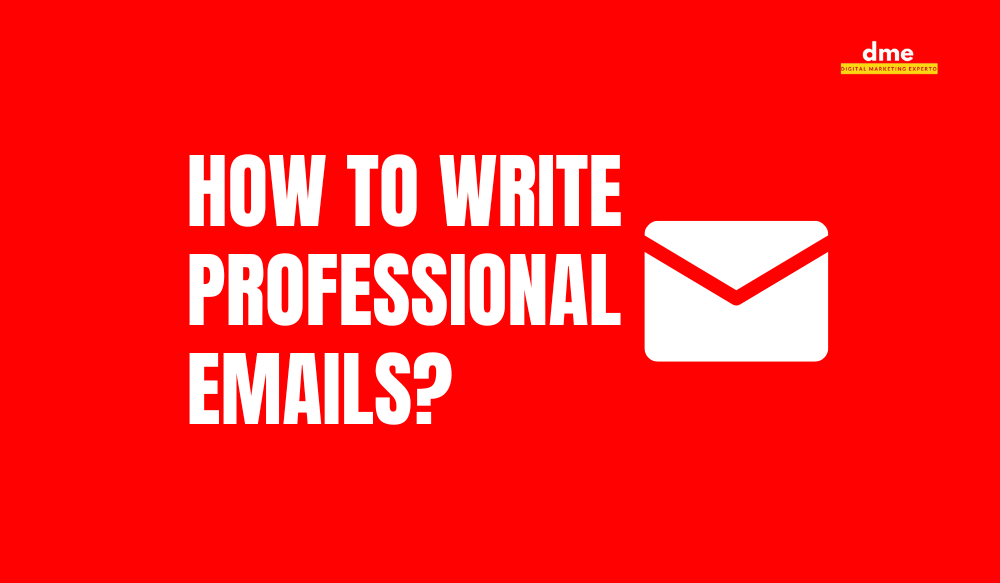Emailing is the most widespread method for employees to stay informed. We exchange meeting specifics, project plans, and work-related information through emails. Professional emailing is the most important thing in today’s scenario. Learning the art of professional emailing will help you to leave a mark on your work etiquette and your effective communication.
Read this article to the end to get the proper idea of professional emailing and how to write it properly. This article has been created by Image Coach Shivani to help the Digital Marketing Experto‘s audiences.
If you send an email to a person in the hope to make a connection, you need to make sure to write a meaningful subject and content. We need to use the most appropriate words. We need to understand that we have to say all our points in the shortest way possible. Email needs to be concise. We have to keep our important points at the beginning of each paragraph, to let them understand your main points clearly.
It is professional emailing so you never have to use slang language, only professional words and sentences are allowed. Re-reading emails before sending is the crucial step, the smallest grammatical errors can spoil your impression. Proofread your written emails before sending them to avoid any mistakes. Appropriate closer is needed, never forget to write the name after adding closer.
Emails always have a clear purpose. Whenever you start writing an email, few questions you should ask yourself. Why you are sending this email? What do you need from your recipient? Is this email necessary? If you cannot answer these questions then you need to stop writing, and figure it out first.
You need to develop empathy skills; it means writing content according to the reader’s point of view. If you do this you will understand their thoughts, feelings, and requirements. Assume yourself as a reader then thinks of your needs from the email. Then start writing and keep in mind like how would I interpret this sentence if someone reading this email.
Why professional writing is important?
Maintaining good relationships in business is extremely important. Many people build their connections through emails in the corporate world. It is essential to have good communication skills in today’s time. Must avoid misunderstandings that can hurt contacts. Formal English writing is preferred for professional emails but sometimes emails depend on the tone of brands too. Then only do we need to go for an informal way of writing. In this article, you will find a simple sorted sample to ease your problem.
Steps to writing clear and professional Emails in English
Subject line – The subject line should be short, concise, and attention-grabbing. It is a short statement of a maximum of 7,8 words which summarizes your intention of emailing. The subject line must have a proper keyword so that recipients can quickly identify your email in their inbox. The subject line determines whether the reader will read your email or send your email in the trash. So keep it worth it.
Greetings – Preferably, you must include the recipient’s name. but if you are not aware of it then use sir/madam. If you want to go with a gender-neutral approach, then use Dear then name. If you want to go specific in this case, for women use the prefix Ms. importantly and for men use Mr. In case, you are sending emails to seniors, or managers that you haven’t met, address them with their last name.
Email body – Recipient focus here the most, this area holds the key information and intention to write the email. Write lines in the way the reader understands your intention. It is important to be conscious of your reader’s time. Write detailed yet concisely. Write in a readable way, and do not use difficult vocabulary no one will going to search the words. Make sure to be clear with your points.
Effective email opening sentences help a lot in building the interest of the reader. The opening should be polite, kind, direct, and clarifies the purpose of the email. Write in paragraphs and write important points at the beginning of the paragraphs to let the reader focus on your main thought. Must have indentations and spaces between the paragraphs for easy reading.
Closing line – This is the line where you can place a CTA (Call to Action) to let the reader take action or inform your reader to go to the next step. Never ever force your reader to respond, they hate it. Write the line in such a convincing way that they cannot resist themselves taking the action. Make them feel motivated and inspired. A great example is – If you could update me on this, I would really appreciate it.
End – This is the last section of the email, this section includes your name, job position, company name, phone number, and possibly, an email address. Also, the signature maintains a sense of authority and professionalism. You can have a digital signature above your name. Ensure to add best regards or thank you before signing your name.
Let me give you an example –
Best regards,
Signature
your name,
job post,
company name,
email address.
Proofreading – Double-check the tone, grammar, lines, everything. No need to take risks. Your email represents your personality, if you make silly mistakes, it will leave mark on your professionalism. Establish a tone that encourages the reader to read the full article and helps them to concentrate. Email free from grammatical and spelling errors helps readers to read fast and more likely to be responsive. Focus on high readability, the recipient should understand what you are trying to convey.
Tips for writing a valuable professional email
Identify your audience – Be aware of your audience, and whom you are going to write to. If you write someone, not from the same industry, you need to explain to them the meaning of all the unfamiliar terminologies you have used in it. Try to keep it simple then. Always maintain a formal style throughout the email. By using informal you can damage your relationship. Never use slang language. Figure out the thing which works, your email should meet the goal.
Write direct and conclusive – Remove every information that is irrelevant. Eliminate the unfamiliar attachments that annoy them. It may confuse the reader and they can exist from your email. If you are confused to attach documents or not then just ask them for their permission first. Be direct to the intention of your email. You need to be very informative, as they have spent their time on you to get something in return.
Keep it concise – No need to share your message in long lengthy emails. It’s irrelevant. If you can communicate and end the para in 2,3 lines, do it. If you are sending emails to high authority then also you no need to write long paragraphs. Avoid being lengthy; be concise, short and to the point, it will save their time and effort. Let them be clear and convinced to take action.
Be professional – To be on top of all perfection, you should be aware of the timings. Do not send emails during their non-working hours and never ask them anything to do that takes or spoils their free time. Only if it’s an emergency, then you may disturb them. Otherwise, avoid it. Always reply to the emails on time, if you postpone an email response for more than 1 working day this will make your work harder. If you are busy and can’t do what they have said then give them an estimated date and time you can reply, and never leave them hanging.
How to impress people with your emails?
Your email salutation makes a difference a lot, it hits people in a different way. When you call them by their names, they will appreciate it. They find it that you are directly talking to them only. But when you write dear/sir they get that you have sent the same message to 100 more people. So, they ignore that most of the time. When you have great techniques to sort this problem out then why take the risk.
Always. prefer to write in active voice, because the active voice is easier to read. It shows action and responsibilities in a more encouraging way. An active voice more talks about the person taking the action. Things happen when people take action in active voice sentences. Whereas passive voice more focuses on the object on which the action is happening. Active voice sentences help you to keep your email short and simple. Moreover, make sure your emails reflect who you are. Also, use thank you and please in your emails, as it helps you to go long way.
Format to write Professional Email
You can use this format and write professional emails for jobs, professional emails to clients, professional emails for internships, and professional emails to customers.
Salutation: – Dear/sir with name, hello everyone. (When you are emailing to a group of people then use this)
Opening sentence: – I hope your week is going well or I hope you had a nice weekend. (Respect their time. Use phrases with kindness.)
Middle paragraph starting: – I am reaching out about…. (Main aim and points. Avoid miscommunication and confusion, go straight.)
Ending paragraph: – Thanks for…… (Show gratitude)
Why professional emails are convenient?
Email is convenient because it doesn’t require the other member to be available at the same time. It keeps the project moving while the other member stays in another world. There is also a setback that some people start spamming with useless emails, that’s not good.
Follow all the steps above and this will help you a lot. It also allows you to make connections for future opportunities. You will necessarily become white-collar in professional email writing. Good luck!
I am a Digital Marketer by profession and Content Writer by passion. I have been writing on Search Engine Optimization, Social Media Marketing, Search Engine Marketing & Content Marketing for years. When I don’t have my nose buried in Digital Marketing, I’m in creative brainstorming, working on content, or debating whether it’s Jeff Bezos or Elon Musk.

